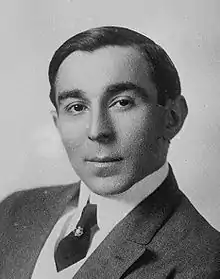Lee Shubert | |
|---|---|
 Shubert in 1908 | |
| Born | Levi Schubart[1] March 25, 1871 Vladislavov, Russian Empire |
| Died | December 25, 1953 (aged 82) New York City, U.S. |
| Nationality | American |
| Occupation(s) | Theatre owner/operator Theatrical producer |
Lee Shubert (born Levi Schubart; March 25, 1871[2]– December 25, 1953) was a Lithuanian-born American theatre owner/operator and producer and the eldest of seven siblings of the theatrical Shubert family.
Biography
Born to a Jewish family, the son of Duvvid Schubart[1] and Katrina Helwitz, in Vladislavov, in the Suwałki Governorate of Congress Poland, a part of the Russian Empire (present-day Kudirkos Naumiestis, Lithuania), Shubert was 11 years old when the family emigrated to the United States and settled in Syracuse, New York, where a number of Jewish families from their hometown already were living. His father's alcoholism kept the family in difficult financial circumstances, and Lee Shubert went to work selling newspapers on a street corner. With borrowed money, he and younger brothers Sam and Jacob eventually embarked on a business venture that led to them to become the successful operators of several theaters in upstate New York.[3][4]
The Shubert brothers decided to expand to the huge market in New York City, and at the end of March 1900 they leased the Herald Square Theatre at the corner of Broadway and 35th Street in Manhattan. Leaving younger brother Jacob at home to manage their existing theatres, Lee and Sam Shubert moved to New York City, where they laid the foundations for what was to become the largest theatre empire in the 20th century, including the Winter Garden and Shubert Theatres.[5]
The all-powerful Theatrical Syndicate essentially excluded competition. Since the Shuberts were not permitted to use Syndicate-controlled theaters, they put on shows in rented circus tents, holding "three times as many customers as the typical theater." In 1910, they formed the "Independent National Theatre Owner's Association", which brought about the defection of many theaters from all around the country that previously had been affiliated with the Syndicate. In 1922, it was announced that "Lee Shubert and A. L. Erlanger ... rivals for twenty years" had reached a working understanding.[6][7][8]
Lee Shubert was a hard nosed businessman who has been criticized for being money and power oriented with little interest in culture. He was well-known for banning critics from all his theaters if they wrote something that upset him, to the point that the laws in the state of New York were changed to prevent the practice.[9] Nonetheless, he recognized the need to attract some of the top stage actors from the long-established European theatres (as Gaby Deslys) to perform at the new Broadway houses. After a disastrous production of Hamlet in 1901 at a competitor's theatre, French megastar Sarah Bernhardt vowed never to return to America until Lee Shubert convinced her to perform for his company in 1905.[8]
At his death Lee Shubert's estate was worth $16 million. He boasted in 1924 of his family success:
- We began building theaters, and introduced practical commercial methods into a flagrantly impractical and precarious profession....This sordid commercialism has helped to make the American stage a legitimate, financial risk, stabilized its revenue, attracted real money to it, reduced the margin of chance, increased its facilities, and widened its opportunities.[10]
Personal life
He was married to Marcella Swanson. They had previously been secretly married on July 29, 1936, in Germany and divorced in September 1948 in Reno, Nevada. They remarried in Miami in March 1949 (Time Magazine reports the remarriage was in February).[11][12][13]
Lee Shubert died in New York City on December 25, 1953, at the age of 82 and was interred in the family plot at Salem Fields Cemetery in Brooklyn.[14]
References
- 1 2 Some sources cite Shubard or Szemanski as the original spelling
- ↑ the New York Times December 26, 1953 obituary gives his date of birth as March 15, 1875, but he told friends he was "more than 80"
- ↑ "Shubert Brothers" pbs.org; retrieved December 30, 2009.
- ↑ Hirsch, pp 9-12
- ↑ "Shubert Brothers A Brief History" shubertarchive.org, retrieved December 30, 2009
- ↑ "Shubert-Erlanger End Long Rivalry", The New York Times, March 4, 1922.
- ↑ About Us shubertfoundation.org; retrieved December 30, 2009.
- 1 2 "Shubert Organization Inc. history fundinguniverse.com, retrieved December 30, 2009
- ↑ Kashmir Hill, Lawyers Barred by Madison Square Garden Found a Way Back In, The New York Times, January 16, 2023, accessed January 16, 2023.
- ↑ Quoted in "Lee Shubert." Dictionary of American Biography (1977) Online
- ↑ "Lee Shubert is Divorced", The New York Times, September 4, 1948, p. 17
- ↑ Hirsch, p. 206
- ↑ People: No Place Like Home", Time Magazine, March 28, 1949.
- ↑ "Lee Shubert Dies in Hospital", The New York Times, December 26, 1953, p. 1
Further reading
- "Lee Shubert." Dictionary of American Biography (1977) online
- Hirsch, Foster. The Boys from Syracuse (1998). SIU Press. ISBN 0-8093-2156-4
- Jonas Westover (2017). The Shuberts and Their Passing Shows: The Untold Tale of Ziegfeld's Rivals, Oxford University Press
- Stagg, Jerry. The Brothers Schubert (1968)
External links
- Lee Shubert at the Internet Broadway Database
- Lee Shubert at Musicals101.com
- Official website Shubert Foundation biography